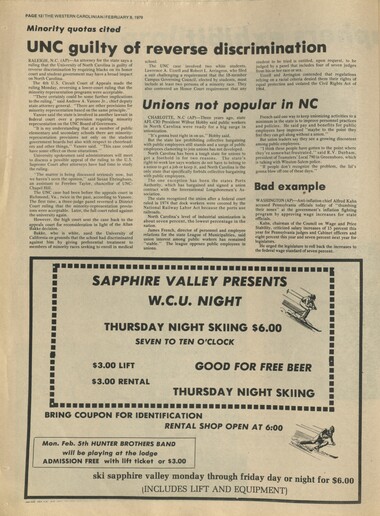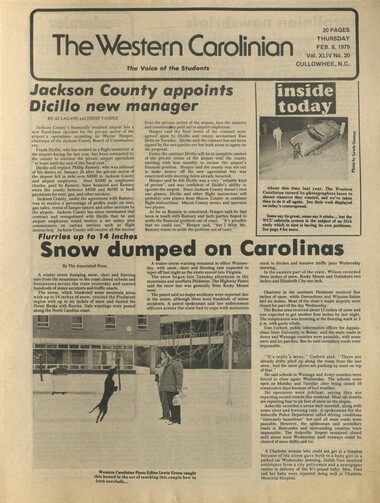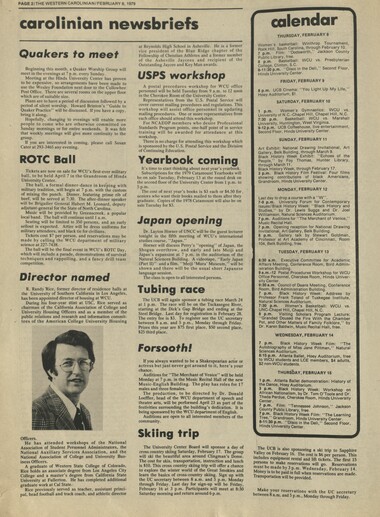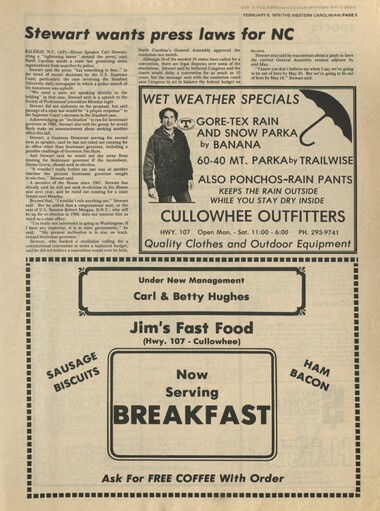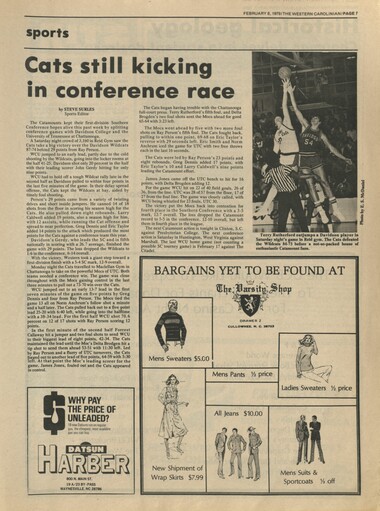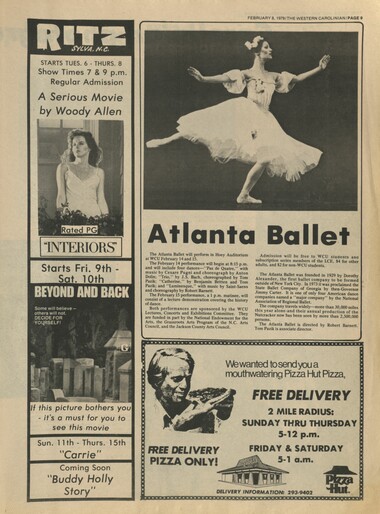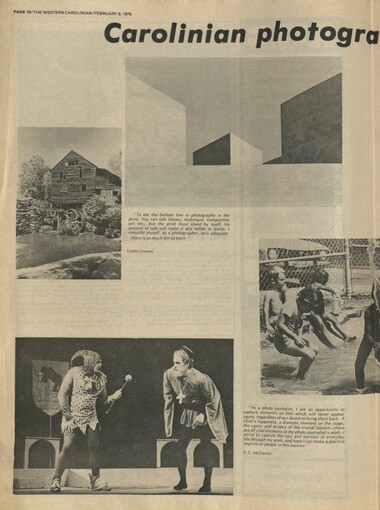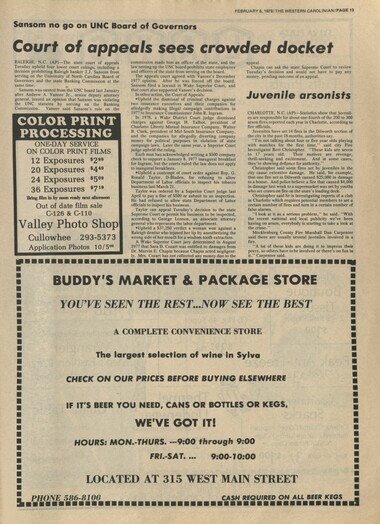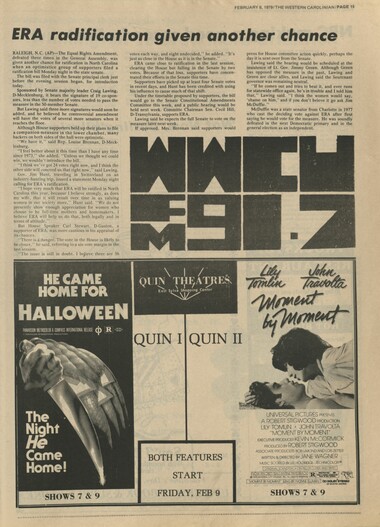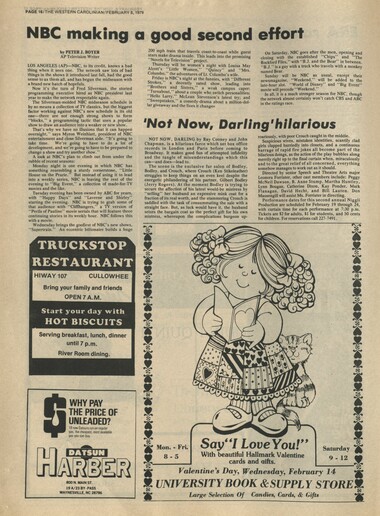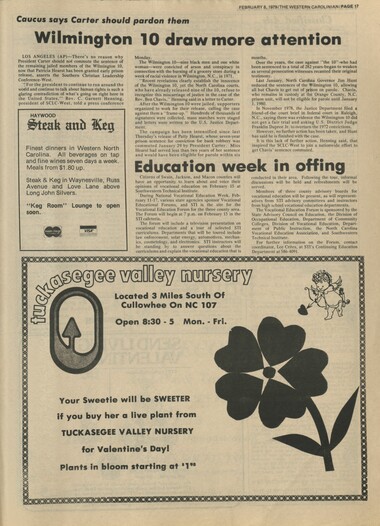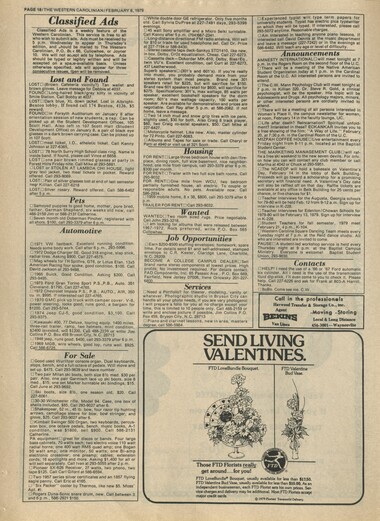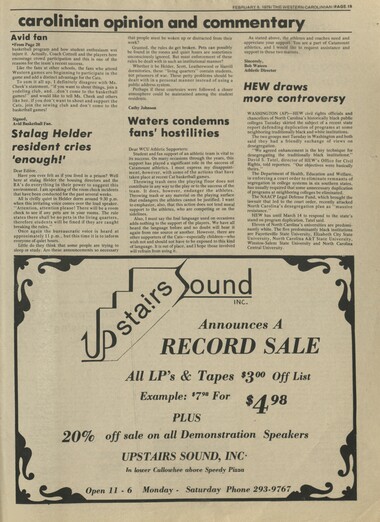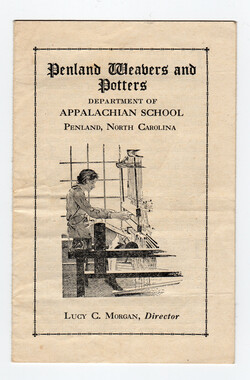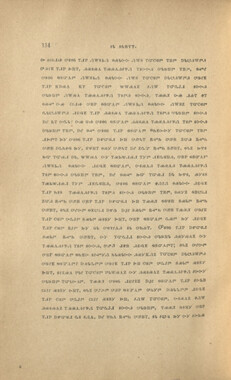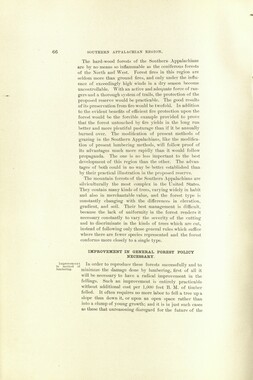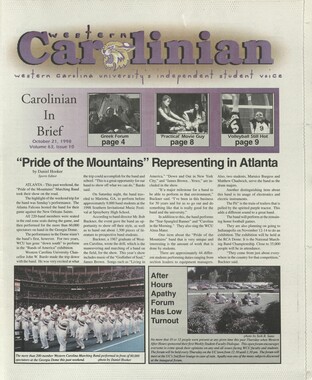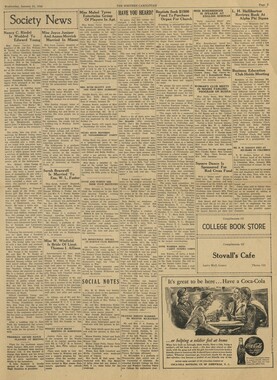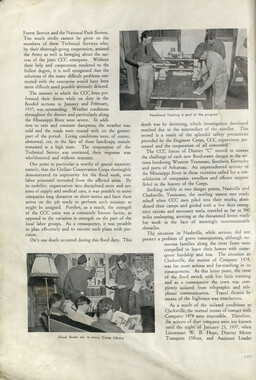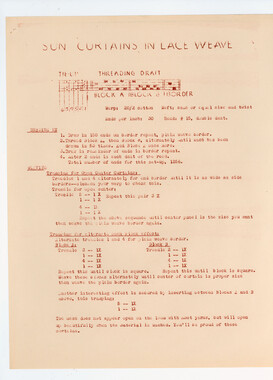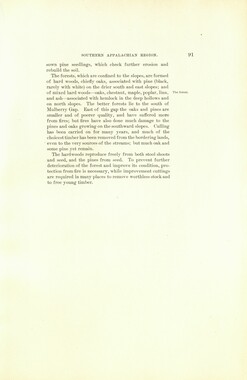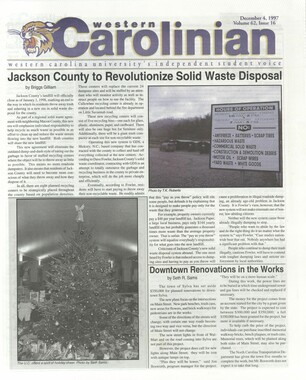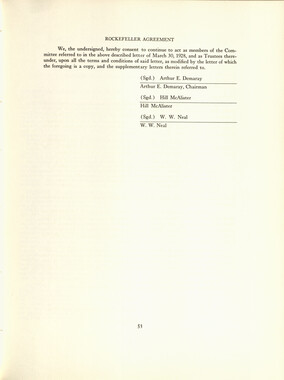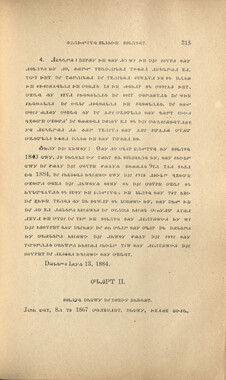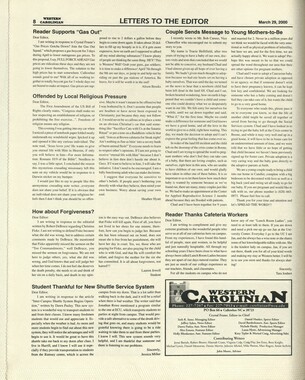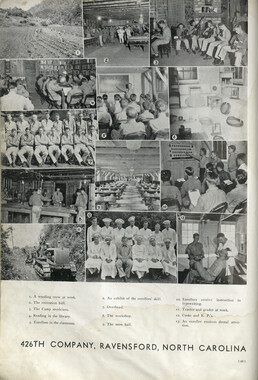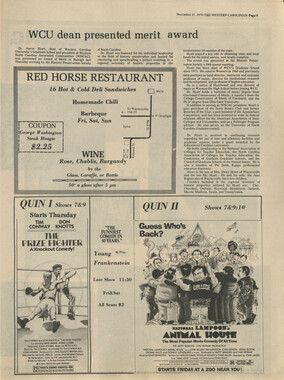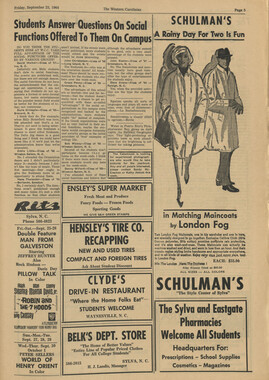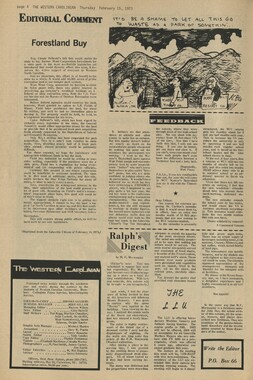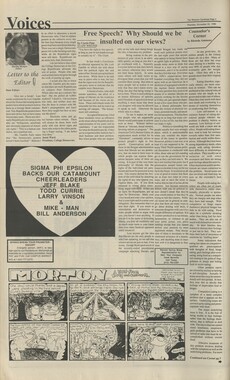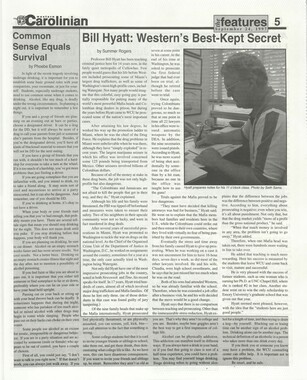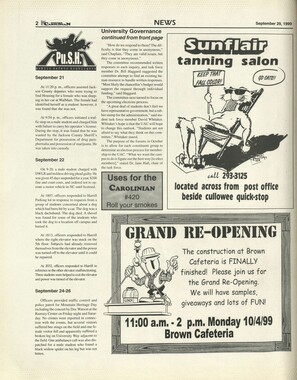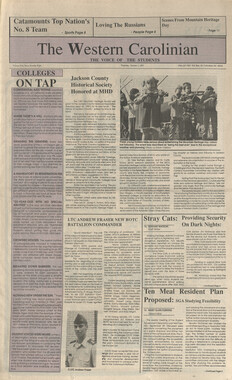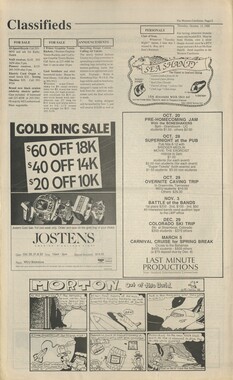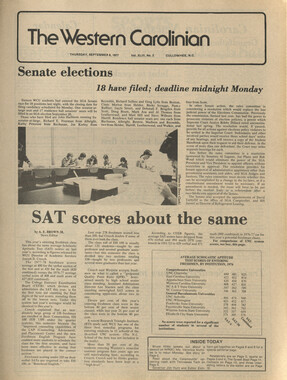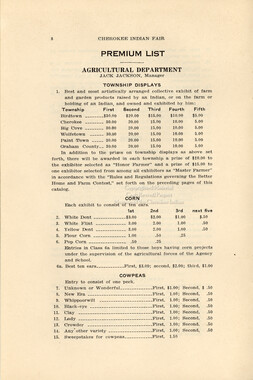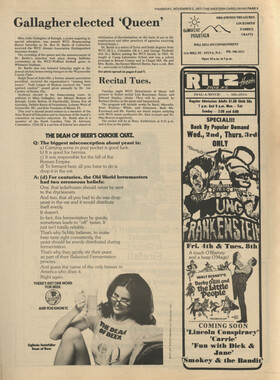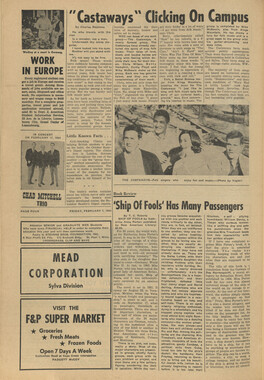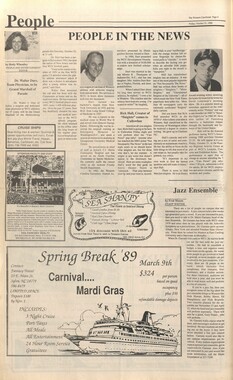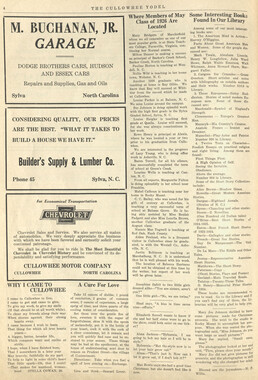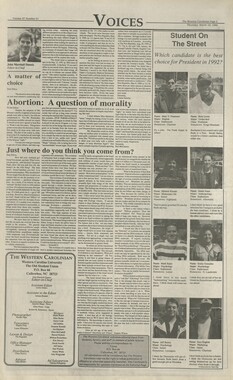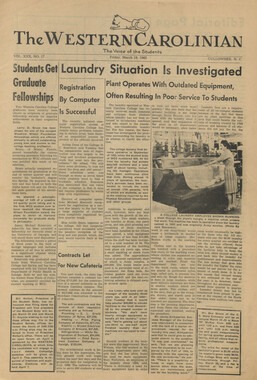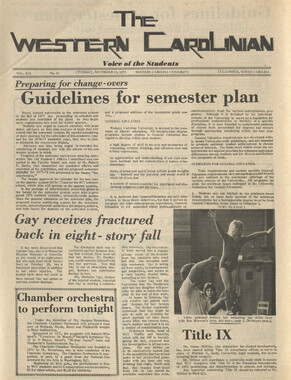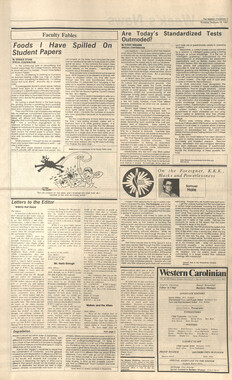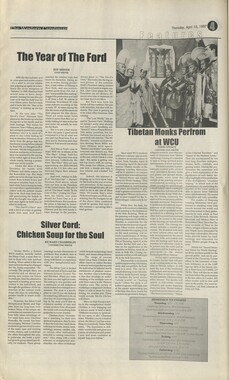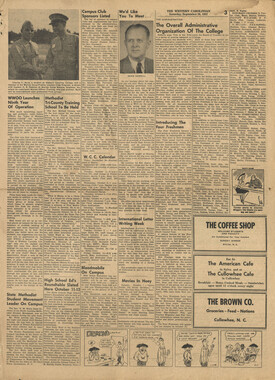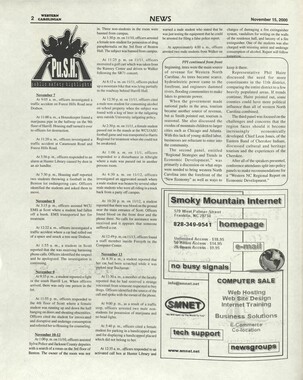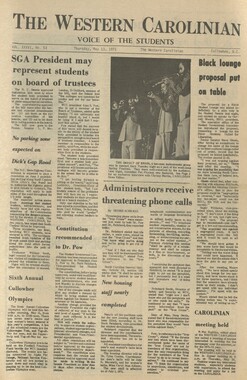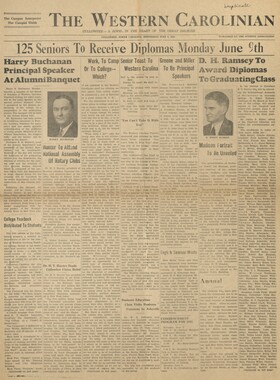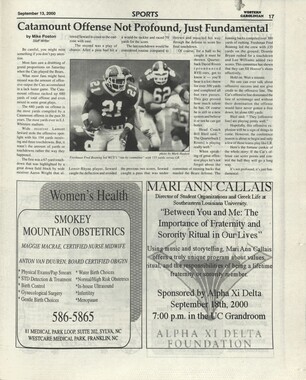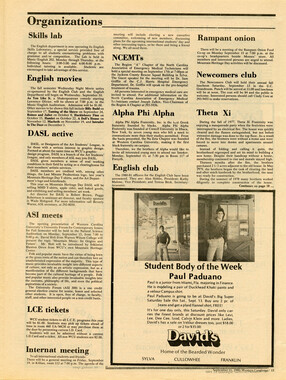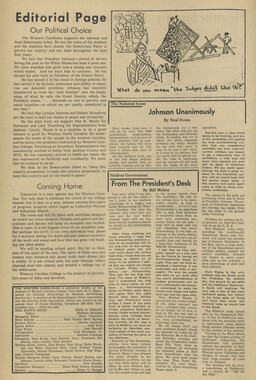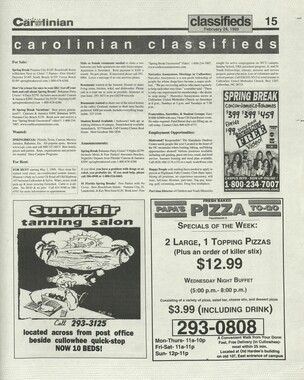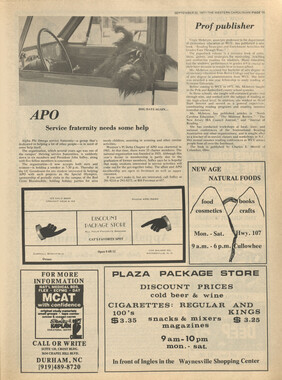Western Carolina University (20)
View all
- Canton Champion Fibre Company (2308)
- Cherokee Traditions (292)
- Civil War in Southern Appalachia (165)
- Craft Revival (1942)
- Great Smoky Mountains - A Park for America (2766)
- Highlights from Western Carolina University (430)
- Horace Kephart (941)
- Journeys Through Jackson (154)
- LGBTQIA+ Archive of Jackson County (85)
- Oral Histories of Western North Carolina (314)
- Picturing Appalachia (6772)
- Stories of Mountain Folk (413)
- Travel Western North Carolina (160)
- Western Carolina University Fine Art Museum Vitreograph Collection (129)
- Western Carolina University Herbarium (92)
- Western Carolina University: Making Memories (708)
- Western Carolina University Publications (2283)
- Western Carolina University Restricted Electronic Theses and Dissertations (146)
- Western North Carolina Regional Maps (71)
- World War II in Southern Appalachia (131)
University of North Carolina Asheville (6)
View all
- Allanstand Cottage Industries (62)
- Appalachian National Park Association (53)
- Bennett, Kelly, 1890-1974 (1388)
- Berry, Walter (76)
- Brasstown Carvers (40)
- Carver, George Washington, 1864?-1943 (26)
- Cathey, Joseph, 1803-1874 (1)
- Champion Fibre Company (233)
- Champion Paper and Fibre Company (297)
- Cherokee Indian Fair Association (16)
- Cherokee Language Program (22)
- Crowe, Amanda (40)
- Edmonston, Thomas Benton, 1842-1907 (7)
- Ensley, A. L. (Abraham Lincoln), 1865-1948 (275)
- Fromer, Irving Rhodes, 1913-1994 (70)
- George Butz (BFS 1907) (46)
- Goodrich, Frances Louisa (120)
- Grant, George Alexander, 1891-1964 (96)
- Heard, Marian Gladys (60)
- Kephart, Calvin, 1883-1969 (15)
- Kephart, Horace, 1862-1931 (313)
- Kephart, Laura, 1862-1954 (39)
- Laney, Gideon Thomas, 1889-1976 (439)
- Masa, George, 1881-1933 (61)
- McElhinney, William Julian, 1896-1953 (44)
- Niggli, Josephina, 1910-1983 (10)
- North Carolina Park Commission (105)
- Osborne, Kezia Stradley (9)
- Owens, Samuel Robert, 1918-1995 (11)
- Penland Weavers and Potters (36)
- Roberts, Vivienne (15)
- Roth, Albert, 1890-1974 (142)
- Schenck, Carl Alwin, 1868-1955 (1)
- Sherrill's Photography Studio (2565)
- Southern Highland Handicraft Guild (127)
- Southern Highlanders, Inc. (71)
- Stalcup, Jesse Bryson (46)
- Stearns, I. K. (213)
- Thompson, James Edward, 1880-1976 (226)
- United States. Indian Arts and Crafts Board (130)
- USFS (683)
- Vance, Zebulon Baird, 1830-1894 (1)
- Weaver, Zebulon, 1872-1948 (58)
- Western Carolina College (230)
- Western Carolina Teachers College (282)
- Western Carolina University (1794)
- Western Carolina University. Mountain Heritage Center (18)
- Whitman, Walt, 1819-1892 (10)
- Wilburn, Hiram Coleman, 1880-1967 (73)
- Williams, Isadora (3)
- Cain, Doreyl Ammons (0)
- Crittenden, Lorraine (0)
- Rhodes, Judy (0)
- Smith, Edward Clark (0)
- Appalachian Region, Southern (2569)
- Asheville (N.C.) (1923)
- Avery County (N.C.) (26)
- Blount County (Tenn.) (161)
- Buncombe County (N.C.) (1672)
- Cherokee County (N.C.) (283)
- Clay County (N.C.) (555)
- Graham County (N.C.) (233)
- Great Smoky Mountains National Park (N.C. and Tenn.) (519)
- Haywood County (N.C.) (3524)
- Henderson County (N.C.) (70)
- Jackson County (N.C.) (4694)
- Knox County (Tenn.) (25)
- Knoxville (Tenn.) (12)
- Lake Santeetlah (N.C.) (10)
- Macon County (N.C.) (420)
- Madison County (N.C.) (212)
- McDowell County (N.C.) (39)
- Mitchell County (N.C.) (132)
- Polk County (N.C.) (35)
- Qualla Boundary (981)
- Rutherford County (N.C.) (76)
- Swain County (N.C.) (2115)
- Transylvania County (N.C.) (270)
- Watauga County (N.C.) (12)
- Waynesville (N.C.) (84)
- Yancey County (N.C.) (72)
- Aerial Photographs (3)
- Aerial Views (60)
- Albums (books) (4)
- Articles (1)
- Artifacts (object Genre) (228)
- Bibliographies (1)
- Biography (general Genre) (2)
- Cards (information Artifacts) (38)
- Clippings (information Artifacts) (191)
- Crafts (art Genres) (622)
- Depictions (visual Works) (21)
- Design Drawings (1)
- Drawings (visual Works) (184)
- Envelopes (73)
- Facsimiles (reproductions) (1)
- Fiction (general Genre) (4)
- Financial Records (12)
- Fliers (printed Matter) (67)
- Glass Plate Negatives (381)
- Guidebooks (2)
- Internegatives (10)
- Interviews (815)
- Land Surveys (102)
- Letters (correspondence) (1013)
- Manuscripts (documents) (618)
- Maps (documents) (177)
- Memorandums (25)
- Minutes (administrative Records) (59)
- Negatives (photographs) (5835)
- Newsletters (1285)
- Newspapers (2)
- Occupation Currency (1)
- Paintings (visual Works) (1)
- Pen And Ink Drawings (1)
- Periodicals (193)
- Personal Narratives (10)
- Photographs (12976)
- Plans (maps) (1)
- Poetry (6)
- Portraits (4533)
- Postcards (329)
- Programs (documents) (151)
- Publications (documents) (2236)
- Questionnaires (65)
- Scrapbooks (282)
- Sheet Music (2)
- Slides (photographs) (402)
- Songs (musical Compositions) (2)
- Sound Recordings (796)
- Specimens (92)
- Speeches (documents) (15)
- Tintypes (photographs) (8)
- Transcripts (322)
- Video Recordings (physical Artifacts) (23)
- Vitreographs (129)
- Text Messages (0)
- A.L. Ensley Collection (275)
- Appalachian Industrial School Records (7)
- Appalachian National Park Association Records (336)
- Axley-Meroney Collection (2)
- Bayard Wootten Photograph Collection (20)
- Bethel Rural Community Organization Collection (7)
- Blumer Collection (5)
- C.W. Slagle Collection (20)
- Canton Area Historical Museum (2110)
- Carlos C. Campbell Collection (282)
- Cataloochee History Project (64)
- Cherokee Studies Collection (4)
- Daisy Dame Photograph Album (5)
- Daniel Boone VI Collection (1)
- Doris Ulmann Photograph Collection (112)
- Elizabeth H. Lasley Collection (1)
- Elizabeth Woolworth Szold Fleharty Collection (4)
- Frank Fry Collection (95)
- George Masa Collection (173)
- Gideon Laney Collection (452)
- Hazel Scarborough Collection (2)
- Hiram C. Wilburn Papers (28)
- Historic Photographs Collection (236)
- Horace Kephart Collection (861)
- Humbard Collection (33)
- Hunter and Weaver Families Collection (1)
- I. D. Blumenthal Collection (4)
- Isadora Williams Collection (4)
- Jesse Bryson Stalcup Collection (47)
- Jim Thompson Collection (224)
- John B. Battle Collection (7)
- John C. Campbell Folk School Records (80)
- John Parris Collection (6)
- Judaculla Rock project (2)
- Kelly Bennett Collection (1407)
- Love Family Papers (11)
- Major Wiley Parris Civil War Letters (3)
- Map Collection (12)
- McFee-Misemer Civil War Letters (34)
- Mountain Heritage Center Collection (4)
- Norburn - Robertson - Thomson Families Collection (44)
- Pauline Hood Collection (7)
- Pre-Guild Collection (2)
- Qualla Arts and Crafts Mutual Collection (12)
- R.A. Romanes Collection (681)
- Rosser H. Taylor Collection (1)
- Samuel Robert Owens Collection (94)
- Sara Madison Collection (144)
- Sherrill Studio Photo Collection (2558)
- Smoky Mountains Hiking Club Collection (616)
- Stories of Mountain Folk - Radio Programs (374)
- The Reporter, Western Carolina University (510)
- Venoy and Elizabeth Reed Collection (16)
- WCU Gender and Sexuality Oral History Project (32)
- WCU Mountain Heritage Center Oral Histories (25)
- WCU Oral History Collection - Mountain People, Mountain Lives (71)
- WCU Students Newspapers Collection (1744)
- Western North Carolina Tomorrow Black Oral History Project (69)
- William Williams Stringfield Collection (2)
- Zebulon Weaver Collection (109)
- African Americans (390)
- Appalachian Trail (35)
- Artisans (521)
- Cherokee art (84)
- Cherokee artists -- North Carolina (10)
- Cherokee language (21)
- Cherokee pottery (101)
- Cherokee women (208)
- Church buildings (170)
- Civilian Conservation Corps (U.S.) (110)
- College student newspapers and periodicals (1830)
- Dams (107)
- Dance (1023)
- Education (222)
- Floods (61)
- Folk music (1015)
- Forced removal, 1813-1903 (2)
- Forest conservation (220)
- Forests and forestry (1184)
- Gender nonconformity (4)
- Great Smoky Mountains National Park (N.C. and Tenn.) (181)
- Hunting (38)
- Landscape photography (25)
- Logging (118)
- Maps (83)
- Mines and mineral resources (8)
- North Carolina -- Maps (18)
- Paper industry (38)
- Postcards (255)
- Pottery (135)
- Railroad trains (71)
- Rural electrification -- North Carolina, Western (3)
- School integration -- Southern States (2)
- Segregation -- North Carolina, Western (5)
- Slavery (5)
- Sports (452)
- Storytelling (244)
- Waterfalls -- Great Smoky Mountains (N.C. and Tenn.) (66)
- Weaving -- Appalachian Region, Southern (280)
- Wood-carving -- Appalachian Region, Southern (328)
- World War, 1939-1945 (173)
Western Carolinian Volume 44 Number 20
Item
Item’s are ‘child’ level descriptions to ‘parent’ objects, (e.g. one page of a whole book).
-
-
PAGE 12/THE WESTERN CAROLINIAN/FEBRUARY 8, 1979 Minority quotas cited UNC guilty of reverse discrimination RALEIGH. N.C. (AP)—An attorney for tin slat.- says a ruling thai thi' University of North Carolina is guilty of reverse discrimination by requiring blacks on its honor court and student government may have a broad impact on North Carolina. The 4th U.S. Circuit Court of Appeals made the ruling Monday, reversing a lower-court ruling that the minority representation programs were acceptable. "There certainly could be some further implications to the ruling," said Andrew A. Vanore Jr., chief deputy state attorney general. "There are other provisions for minority representation based on the same principle." Vanore said the state is involved in another lawsuit in federal court over a provision requiring minority representation on the UNC Board of Governors. "It is my understanding that at a number of public elementary and secondary schools there are minority- representation provisions not only on the student government boards but also with respect to cheerleaders and other things," Vanore said. "This case could have some effect on those situtations." University spokesmen said administrators will meet to discuss a possible appeal of the ruling to the U.S. Supreme Court after attorneys have had time to study the ruling. "The matter is being discussed seriously now, but we haven't seen the opinion," said Susan Ebringhaus. an assistant to Ferebee Taylor, chancellor of UNC- Chapel Hill. The UNC case had been before the appeals court in Richmond, Va., twice in the past, according to Vanore. The first time, a three-judge panel reversed a District Court ruling that the minority-representation provisions were acceptable. Later, the full court ruled against the university again. However, the high court sent the case back to the appeafs court for reconsideration in light of the Allan Bakke decision. Bakke, who is white, sued the University of California on grounds that the school had discriminated against him by giving preferential treatment to members of minority races seeking to enroll in medical school. Ihe UNC case involved two white students, Lawrence A. Uzzell anil Robert L. Arringron, who filed a suit challenging a requirement that the 18-niember Campus Governing Council, elected by students, must Include at least two persons of a minority race. They also contested an Honor Court requirement that any Student to be tried is entitled, upon request, to be judged by a panel that includes four of seven judges from his or her race or sex. Uzzell and Arrington contended that regulations relying on a racial criteria denied them their rights of equal protection and violated the Civil Rights Act of 1964. Unions not popular in NC CHARLOTTE, N.C (AP)—Three years ago, state AFL-CIO President Wilbur Hobby said public workers in North Carolina were ready for a big surge in unionization. "It's gonna bust right in on us," Hobby said. But the state law prohibiting collective bargaining with public employees still stands and a surge of public employees clamoring to join unions has not developed. North Carolina has been a tough state for unions to get a foothold in for two reasons. The state's right-to-work law says workers do not have to belong to a union to get a job or keep it, and North Carolina is the only state that specifically forbids collective bargaining with public employees. The one exception has been the states Ports Authority, which has bargained and signed a union contract with the International Longshoremen's Association. The state recognized the union after a federal court ruled in 1974 that dock workers were covered by the National Railway Labor Act because the ports use railroads. North Carolina's level of industrial unionization is about seven percent, the lowest percentage in the nation. James French, director of personnel and employee relations for the state League of Municipalities, said union interest among public workers has remained "stable." The league opposes public employees in unions. French said one way to keep unionizing activities to a minimum in the state is to improve personnel practices and policies. He said pay and benefits for public employees have improved "maybe to the point they feel they can get along without a union." But union leaders say they see a growing discontent among public employees. "I think these people have gotten to the point where they're somewhat frustrated," said R.V. Durham, president of Teamsters' Local 790 in Greensboro, which is talking with Winston-Salem police. "If people don't recognize the problem, the lid's gonna blow off one of these days." Bad example WASHINGTON (AP)—Anti-inflation chief Alfred Kahn accused Pennsylvania officials today of "thumbing their noses" at the government's inflation fighting program by approving wage increases for state officials. Kahn, chairman of the Council on Wage and Price Stability, criticized salary increases of 15 percent this year for Pennsylvania judges and Cabinet officers and eight percent this year and seven percent next year for legislators. He urged the legislature to roll back the increases to the federal wage standard of seven percent. SAPPHIRE VALLEY PRESENTS W.C.U. NIGHT THURSDAY NIGHT SKIING $6.00 SEVEN TO TEN O'CLOCK $3.00 LIFT $3.00 RENTAL GOOD FOR FREE BEER THURSDAY NIGHT SKIING BRING COUPON FOR IDENTIFICATION RENTAL SHOP OPEN AT 6:00 Mon. Feb. 5th HUNTER BROTHERS BAND will be playing at the lodge ADMISSION FREE with lift ticket or $3.00 ski sapphire valley monday through friday day or night for $6.00 [INCLUDES LIFT AND EQUIPMENT)
Object
Object’s are ‘parent’ level descriptions to ‘children’ items, (e.g. a book with pages).
-
The Western Carolinian is Western Carolina University's student-run newspaper. The paper was published as the Cullowhee Yodel from 1924 to 1931 before changing its name to The Western Carolinian in 1933.
-
